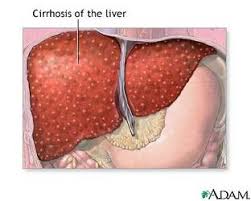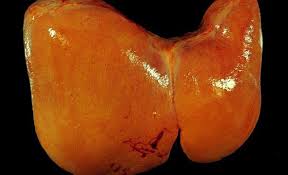Fatty liver is just what its name suggests: the build-up of fat in the liver cells. Although this is not a normal condition, fat in the liver usually causes no damage by itself. However, on some occasions it can be a sign that other more harmful conditions are at work.
Fatty liver may be associated with or may lead to inflammation of the liver. This can cause scarring and hardening of the liver. When scarring becomes extensive, it is called cirrhosis, and this is a very serious condition. Therefore, it is important that a physician thoroughly examine a patient with fat in the liver.


The term hepatitis means inflammation of and damage to the liver cells. Steato (pronounced stee-at´-toe) refers to fat. Therefore, steatohepatitis is inflammation of the liver related to fat accumulation. Heavy alcohol use can lead to fatty liver and inflammation, usually called alcoholic hepatitis. Steatohepatitis resembles alcoholic hepatitis, but it can and does occur in people who seldom or never drink alcohol. In this instance, it is often called nonalcoholic steatohepatitis or NASH. Both alcoholic hepatitis and steatohepatitis can lead to serious liver damage and cirrhosis.
Studies have shown that many people who are significantly overweight have developed, or will develop, steatohepatitis. It can also occur with rapid weight loss. Steatohepatitis has been connected to estrogen hormones in some women. In the case of diabetes mellitus, researchers believe steatohepatitis may develop only in those patients whose diabetes is not properly controlled. |
In most instances, treatment of fatty liver and steatohepatitis requires control of the underlying conditions. This may include reduction of high blood triglycerides, good control of diabetes, or not drinking alcohol. In some cases, surgical reversal of intestinal bypass for obesity is required.
Since being overweight is by far the most critical factor, weight loss is the key to ridding the liver of fat. This is especially necessary if damage to the liver is occurring, and early signs of scarring are present on biopsy. High blood triglycerides and diabetes are also worse with obesity. So, when steatohepatitis is present with these conditions, people gain even greater benefits from losing weight. Losing weight can be difficult. However, it must be done because the alternative may be eventual cirrhosis and the need for a liver transplant. Currently, studies are underway on certain drugs such as Actigall. This drug appears to reduce liver damage in cases of steatohepatitis. At this time, however, it is not certain how helpful these drugs will be. To repeat the point, losing weight is by far the most important treatment.
tags:The term hepatitis , the liver cells,fatty liver ,studies,
|


I was diagnosed as HEPATITIS B carrier in 2013 with fibrosis of the
ReplyDeleteliver already present. I started on antiviral medications which
reduced the viral load initially. After a couple of years the virus
became resistant. I started on HEPATITIS B Herbal treatment from
ULTIMATE LIFE CLINIC (www.ultimatelifeclinic.com) in March, 2020. Their
treatment totally reversed the virus. I did another blood test after
the 6 months long treatment and tested negative to the virus. Amazing
treatment! This treatment is a breakthrough for all HBV carriers.